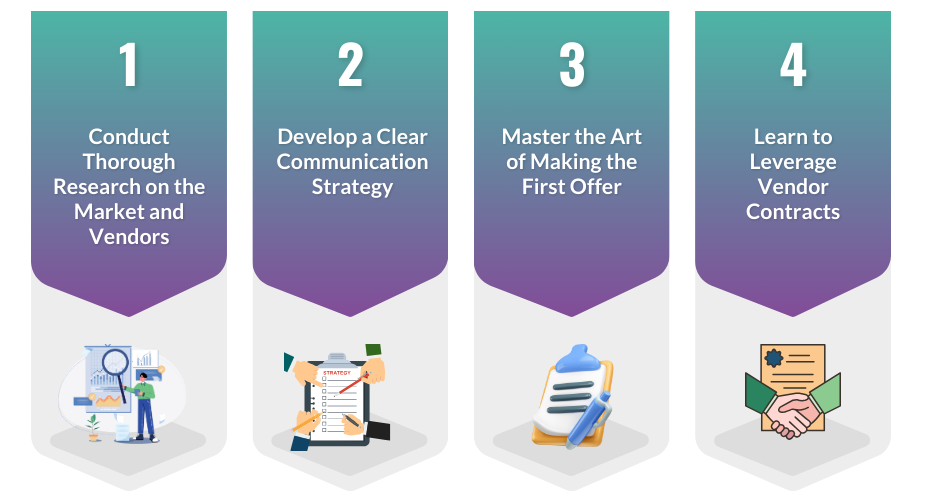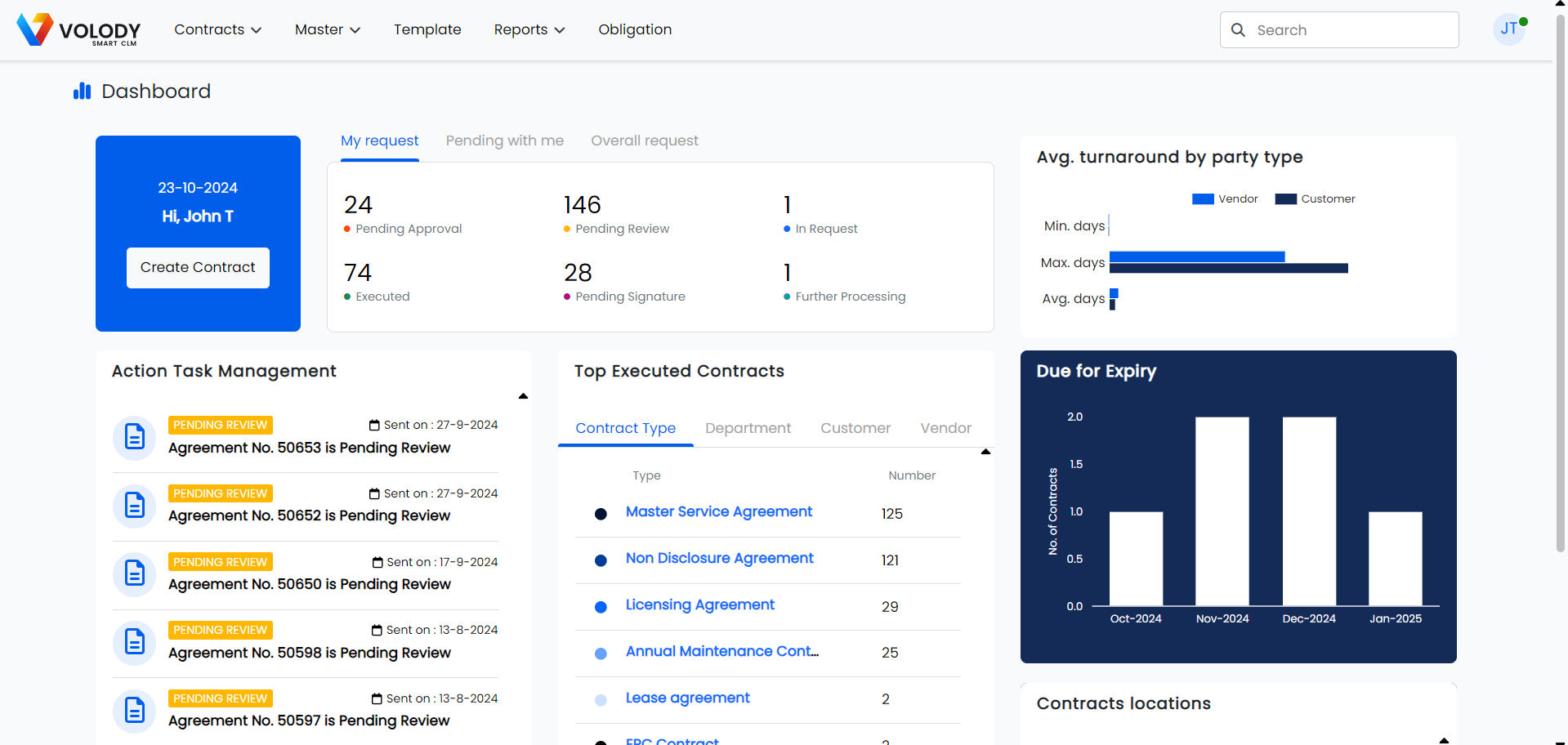Knowing how to handle vendor contracts and negotiate them can feel overwhelming, especially if you are just starting. But, using a good negotiation strategy can help businesses get the best terms. This simple guide will provide you with important knowledge and easy tips. You will feel more confident when you approach vendor negotiations and get more value for your business.
Understanding Vendor Negotiation

What is Vendor Negotiation?
Vendor negotiation is all about finding terms that both the buyer and supplier can agree on. It’s a step-by-step process that includes talking, making offers, and counteroffers. The aim is to reach a compromise that works for everyone involved. To be good at vendor negotiation, you need strong negotiation skills. This includes good communication, active listening, and strategic thinking.
Successful vendor negotiation depends on knowing how to state your needs while keeping friendly cooperation. It’s about finding common ground. This is where both sides feel listened to and valued. This helps create a good agreement that benefits everyone involved.
By learning different vendor negotiation strategies, businesses can get ahead of the competition. They can secure better terms, save money, and ensure a steady supply of high-quality goods and services.
The Importance of Effective Vendor Negotiation
Successful vendor negotiation leads to cost savings for your business. When you get better prices for goods and services, you can use those saved resources in other parts of your operation. Besides the immediate savings, good negotiation also paves the way for a long-term, beneficial partnership.
When vendors feel appreciated and respected, they are more willing to put in extra effort to meet your needs. This kind of teamwork can help improve efficiency. It can also lead to better quality goods and services. Plus, it gives you more flexibility to handle your changing business needs.
When you see vendor negotiations as a chance to create long-lasting partnerships, it is better than just a deal. This way, both sides can benefit. This approach helps both businesses to succeed in the long run.
Related Article: Contract Review Checklist: An Effective Guide
Preparing for Vendor Negotiation: A Beginner’s Guide

Before starting any vendor negotiation, especially if you are new to it, you must prepare well. It’s not enough to just think of a number. Instead, you should gather knowledge and tools that help you feel sure as you go through the negotiation process.
This preparation means figuring out what you need. You should also look into different vendors out there. Finally, you need to set clear goals. These goals will help guide your negotiation strategy.
Essential Resources and Tools Needed
Effective vendor negotiation needs the right tools and information. Here are the key essentials:
- Market Research: Do market research well. This helps you learn about industry standards, competitor prices, and how good vendors are.
- Vendor Information: It is important to know the vendor’s history, finances, and customer reviews in detail.
- Clear Communication Channels: Set up clear ways to talk with vendors. Use email, phone, and video calls.
- Negotiation Plan: Before you start the negotiation process, know your goals, bottom line, and what you can give up if needed.
Having these resources ready will make your negotiation process easier. It will show vendors that you are professional and well-prepared. This helps improve your standing when you negotiate. As a result, you will have a better chance of getting favorable terms.
Establishing Your Negotiation Goals
A good negotiation strategy depends on having clear and realistic goals. What are your must-haves? Where can you be flexible? It’s important to know your bottom line, which is the least you can accept. This way, you won’t get swept away in the moment and agree to harmful terms for your business.
Think about more than just the price. Look at payment terms, delivery dates, how long the contract is, and any possible discounts for paying early or buying in larger amounts. Align these points with your overall business goals. This way, you can set your priorities better during the negotiation process.
Sometimes, getting a lower price feels good at first. But, it might end up costing you more later if the other terms are not good. By looking at all your business needs, you can make smart choices that help you in the long run.
Related Article: What is Central Repository? An Effective Guide
Step-by-Step Guide to Vendor Negotiation

Having a good plan for vendor negotiation can help you stay on track and improve your chances of getting good results. Here is a clear step-by-step guide to help you through the vendor negotiation process:
Each step is important for getting the best terms for your business. This includes doing good research and learning how to make the first offer.
Step 1: Conduct Thorough Research on the Market and Vendors
Before you talk to any vendors, it is important to do some research. You need to understand who the vendors are, what they offer, and how they compare to each other. This background helps you negotiate better deals. Learn about the common pricing models, contract terms, and service levels used in your industry.
Use online tools, and industry reports, and look at what your competitors are doing. This can help you understand vendor pricing and how happy customers are. This information is very useful for the negotiation process. It helps you see if vendor proposals are fair and allows you to make smart counteroffers.
Investing time in market research helps you stand out from others. It allows you to talk confidently with vendors. You can show that you understand the market well. This also shows that you are dedicated to getting the best terms possible.
Step 2: Develop a Clear Communication Strategy
Effective communication is the foundation of a successful negotiation. Before talking to vendors, plan your way of communicating. Make sure you are clear and brief, and keep a professional tone. Speak openly about your needs, what you expect, and what you want to achieve. This helps to prevent misunderstandings and makes sure everyone understands each other.
- Use active listening skills to understand the vendor’s point of view.
- Know their limits and where they can be flexible.
- Asking clear questions shows you are paying attention.
- This also helps you find useful information for the negotiation.
Negotiation tactics need a bit of back-and-forth. Stay calm and professional. Focus on finding a solution that works for both sides. When you keep the conversation open and respectful, it helps create a better space for achieving a deal that is good for everyone.
Step 3: Master the Art of Making the First Offer
Making the first offer can feel scary, but it’s a chance to guide the negotiation your way. You might start strong with an offer that is bold but fair. This shows you are ready to negotiate but also sets high expectations.
Do not rely only on the vendor’s first proposal for your offer. Use your market research, budget limits, and the value the vendor provides to your business to guide you. Keep in mind that your first offer is usually not your final offer.
Be ready to explain your proposal. Use data and market insights to show the long-term value you offer as a client. This shows you are serious about buying. It also helps start a more strategic negotiation process.
Step 4: Learn to Leverage Vendor Contracts
The vendor contract is important. It is a legal agreement that explains the details of your relationship. You should read each part carefully. If something is unclear, ask for details. Focus on payment terms, delivery dates, rules for ending the contract, limits on responsibility, and rights related to intellectual property.
Negotiating favorable terms in the contract is very important for protecting what you need. If some parts of the contract do not fit your business needs or feel risky, feel free to suggest changes or ask for updates to those clauses.
A good vendor contract protects your business. It helps reduce risks and leads to a smoother partnership that benefits both sides. Taking the time and effort to make it correct is important.
Related Article: What is Contract Workflow? Benefits of Automating Approvals
Advanced Strategies in Vendor Negotiation

As your business grows, your relationships with vendors can get more complicated. It’s important to look into better negotiation strategies to improve your results. These advanced strategies are more than simple ones. They provide you with the tools and methods you need to handle tricky negotiations. With these, you can get the best deals possible.
Using technology and building strong partnerships can greatly improve your vendor management. These smart strategies can help you get the most value from your investments.
Utilizing Contract Lifecycle Management (CLM)
Using contract lifecycle management during vendor negotiation helps keep the process smooth and efficient. With contract management software, you can better handle the vendor contract negotiation. You can do this by mapping out clear communication, defining payment terms, and setting up a strong service plan. contract management software is important because it helps align business goals with favorable terms. This can lead to cost savings and better vendor management. By using contract management software, you have a clear way to negotiate with vendors, which improves the efficiency and success of the overall process.
How Volody Can Enhance Your Negotiation Process
Volody is an AI platform that can change how you negotiate. It makes your vendor negotiation process easier and more efficient. It stores all vendor contracts in one secure place, so you can quickly access key details like terms, and renewal dates. With AI-powered insights, Volody helps you find opportunities to save costs and highlights important negotiation points. Workflow automation speeds up approvals and communication, cutting down delays. Whether you’re managing procurement or tracking contract performance, Volody offers the tools to negotiate faster and more confidently.
Related Article: How to Simplify Contract Approvals? A Comprehensive Guide
Conclusion
In vendor negotiation, being prepared is very important. You should know how crucial effective negotiation is. Good resources, clear communication, and using contracts are all key parts of this process. There are also smart strategies like Contract Lifecycle Management (CLM) and helpful tools like Volody that can make your negotiation better. If you use a clear method and practice negotiation skills, even beginners can feel sure when dealing with vendor negotiations and can get good results. Remember, negotiation is something you can get better at with practice and experience. Keep improving your skills, learn about market trends, and be ready to change your approach for successful vendor negotiations.
FAQs
What Are the Key Components of an Effective Vendor Negotiation?
Effective vendor negotiation relies on a clear negotiation strategy. You need good vendor negotiation skills. Communication should be clear. It’s also important to understand your business needs. This includes knowing the payment terms you want.
What are some key factors to consider before entering into vendor negotiations?
Before starting vendor negotiations, think about several things. First, set clear goals. Next, research market trends. Define how you will communicate. Lastly, understand vendor contracts. All these factors are important for a successful negotiation process.
What are some common negotiation tactics used by vendors and how can I respond to them?
Common negotiation tactics used by vendors include price anchoring, time pressure, and flattery. To respond effectively, stay focused on your goals and avoid being swayed by emotions. Be prepared with market research to counter price anchoring, set your own timeline to combat time pressure, and remain objective to not fall for flattery. Remember, staying firm yet flexible is key in handling vendor negotiation tactics.





